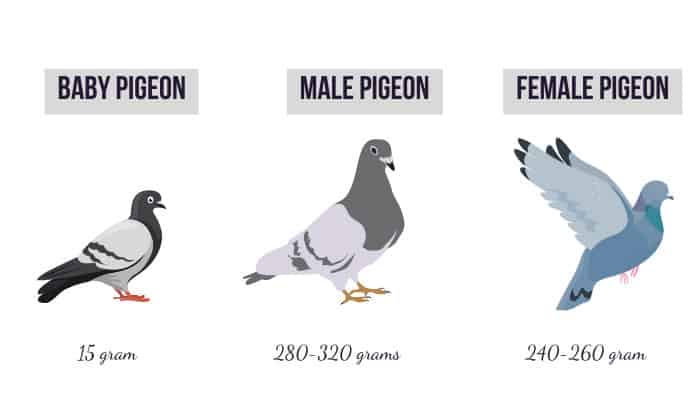The weight of a pigeon can vary depending on its size and type. On average, the pigeons commonly seen weigh around 250-350 grams or 0.6-1 pounds. However, different types of pigeons can have different weights, with some species weighing two to three times more than the average pigeon. Male and female pigeons also have varying weights. Pigeons are fascinating creatures that can carry additional weight, making them even more impressive.

How Much Does A Male & Female Pigeon Weight?
While a regular pigeon weighs around 8-9 ounces, the weight of male and female pigeons can vary. Generally, male pigeons weigh slightly more than their female counterparts, with an average weight range of 9-13 ounces.
Female pigeons, on the other hand, typically weigh between 7-12 ounces. It’s important to note that the weight of a pigeon can also depend on factors such as age, diet, and overall health.
As a responsible owner, it’s essential to monitor your pigeon’s weight and make adjustments to their diet and environment as needed to ensure they remain healthy and happy.
All About a Pigeon’s Weight
A pigeon’s weight can vary depending on its age, diet, and overall health. On average, a regular pigeon will weigh between 8-12 ounces. Male pigeons typically weigh more than female pigeons, with an average range of 9-13 ounces for males and 7-12 ounces for females.

- Baby pigeon
The average weight of a newly hatched baby pigeon is approximately 15 grams. As they develop, they need to gain between 4 and 8 grams per day to ensure their healthy growth.
The weight chart for pigeons indicates that at 20-24 days old, they should weigh between 300-350 grams. This indicates that they are growing at a healthy rate and are on track to reach their full size and weight as adult pigeons.
It’s important to monitor the weight of baby pigeons regularly to ensure they are getting enough nutrition and are growing properly.
- Male pigeon
There are noticeable differences between male and female pigeons. Male pigeons are larger and heavier, weighing on average between 280-320 grams.
They also have a rounder and thicker appearance compared to female pigeons. These differences in size and appearance can help distinguish between male and female pigeons.
- Female pigeon
Female pigeons are generally smaller in size than males and can only weigh up to 240-260 grams. This is important to note when identifying the sex of a pigeon, as size and weight can be helpful indicators.
While males may be larger and heavier, females can still be healthy and strong. It’s important to provide proper nutrition and care for all pigeons, regardless of their sex or size.
Pigeon Types
Pigeons are a diverse group of birds, with many different species and types. While the typical pigeon weighs around 300 grams, this can vary depending on the specific type of pigeon.
1. Racing Pigeons
Racing pigeons are bred specifically for their speed and endurance. These birds are trained to fly long distances and are used in competitive racing events. They are typically smaller and more streamlined than other types of pigeons, with a weight range of 200-250 grams.
2. Fancy Pigeons
Fancy pigeons are bred for their unique and ornamental features, such as feather patterns and coloration. These birds come in many different varieties and can range in weight from 300-600 grams.
3. Homing Pigeons
Homing pigeons are bred for their strong homing instincts and are often used to carry messages or packages over long distances. These birds are typically larger and heavier than racing or fancy pigeons, with a weight range of 400-600 grams.
4. Roller Pigeons
Roller pigeons are bred for their unique ability to perform backward somersaults in mid-air. These birds are typically smaller and more compact than other types of pigeons, with a weight range of 200-300 grams.
5. Tumbler Pigeons
Tumbler pigeons are bred for their ability to perform acrobatic stunts in flight, such as somersaults and spins. These birds are typically medium-sized, with a weight range of 300-400 grams.
6. Wood Pigeon
The wood pigeon is a larger species of pigeon that can weigh up to two or three times more than the average common pigeon. Typically, wood pigeons weigh between 300-615 grams.
7. Stock Dove
The stock dove is a medium-sized pigeon that can be found in woodlands and farmlands. It weighs an average of 300 grams, making it larger than the average dove which weighs 120-170 grams. However, the weight of doves can vary depending on the species, with some being smaller or larger than others.
The mourning dove is the most commonly seen type of dove in North America. They are known for their slender and graceful appearance, with a plump body. Mourning doves typically weigh between 96-170 grams, falling within the range of the average dove.
Some Facts About Pigeons Weight
Pigeons range in weight from as little as 96 grams to over 600 grams, depending on the type of pigeon. Racing pigeons are typically smaller and more streamlined than other types of pigeons, with a weight range of 200-250 grams.
1. Heaviest pigeon:
The Victoria crowned pigeon holds the title for the largest wild pigeon species, weighing over 3.5 kg, as recognized by the Guinness World Records. This majestic bird is known for its impressive size and is a fascinating species to observe.
Its recognition by the Guinness World Records highlights the importance of preserving our planet’s diverse wildlife and natural habitats.
2. Lightest pigeon:
The New World Ground Dove has a weight of less than 40 g, making it the smallest species in the pigeon/dove family. This bird is at the opposite end of the size spectrum from the largest members of the family, such as the Victoria Crowned Pigeon.
Despite its small size, the New World Ground-Dove is still an important part of the ecosystem and plays a vital role in pollination and seed dispersal.
3. Pigeons Can Become Obese:
Obesity is not just a problem for humans; even pigeons can be affected. Pigeons weighing more than 15% of the standard ideal weight range of 250-350 grams are classified as overweight. You can also tell if a pigeon is overweight if their neck is difficult to see due to excess fat.
It’s important to monitor your pet pigeon’s weight and provide them with a balanced diet and regular exercise to ensure their health and well-being. Overweight pigeons may be at risk for health issues such as heart disease, joint problems, and shortened lifespan.
Importance of Determining Pigeon Weight
Monitoring the weight of your pet pigeon is crucial for ensuring their health and well-being. Rapid fluctuations in weight may suggest potential underlying health concerns, such as illness or parasite infestation. It can also affect their ability to fly and perform other activities.
Regularly monitoring a pigeon’s weight is important for responsible pet ownership. One possible method for determining a bird’s weight is by using a small scale or by holding it in the hand and weighing it. Keeping track of weight changes can help identify and address any possible health issues.
In addition, keeping track of your pigeon’s weight can assist in modifying their diet and ensuring proper nutrition. A balanced diet is essential for maintaining their health and preventing any weight-related issues. By ensuring they receive proper nutrition, you can keep your pet pigeon happy and healthy for years to come.
The Equipment and Techniques Used for Measuring Pigeon Weight
To obtain an accurate measurement of a pigeon’s weight, it is necessary to use appropriate equipment such as kitchen scales, digital scales, or gram scales. The pigeon needs to be placed on the scale carefully and its weight should be recorded accurately for measurement purposes.
This process ensures that the weight is accurate and can be used for various purposes, such as monitoring the bird’s health or determining the appropriate amount of food to provide.
The Best Practices for Accurately Measuring Pigeon Weight
Measuring your pet pigeon’s weight is an essential part of monitoring its health. To get the most accurate reading, it’s important to follow some best practices.
1. Calibrating the Scale
To ensure accuracy, make sure the scale is calibrated before weighing your pigeon. This will help eliminate any measurement errors.
2. Gentle Placement and Immediate Recording
Place your pigeon gently on the scale and record the weight immediately after the measurement. This will help reduce stress for your pet and ensure an accurate reading.
3. Consistent Weighing Conditions
For precise measurements, it is recommended to weigh your pigeon consistently at the same time and under similar conditions every day. This will help you track any changes in weight over time.
4. Avoid Weighing After Eating
To obtain accurate weight measurements, it is recommended to avoid weighing a pigeon after it has consumed food. Wait at least an hour after feeding before weighing your pet.
By implementing recommended procedures, one can precisely assess the weight of their domestic pigeon and monitor its wellness.
Pros and Cons of Pigeons Weight
Pigeons are known for their ability to compete for food due to their weight, which is heavier than most birds. Providing unrestricted access to food may increase the likelihood of obesity.
Pigeons may experience difficulty flying if they become too overweight, potentially increasing their risk of predation.It is important to monitor a pigeon’s weight and provide a balanced diet to ensure their health and safety.
FAQs
The weight range for pigeons is typically between 300 to 600 grams, with variations depending on breed and age.
It is possible for various pigeon breeds to exhibit varying weights, with some breeds being lighter or heavier than others.
The weight of a pigeon can be affected by its diet, and a diet high in protein and low in fat is recommended for maintaining a healthy weight.
Determining the ideal weight range for a pigeon involves considering its breed and age, and can be done by seeking guidance from a veterinarian or avian specialist.
To ensure precise measurement of a pigeon’s weight, using a scale that is specifically designed for birds is suggested. The weighing process can be done by placing the pigeon in a weighing cage or holding it with the help of another person.
Measuring the weight of pigeons on a regular basis is advised for health monitoring and weight management purposes. Changes in weight can indicate potential health issues.
The weight of a pigeon may vary due to factors such as diet, age, and health. Consistent weighing can aid in identifying and managing any abrupt weight fluctuations.
The weight of a pigeon varies depending on several factors and its breed. On average, pigeon birds weigh between 1.9-4.6 lb (0.9-2.1 kg).
Pigeons are able to carry up to 10% of their body weight without risk, according to Pigeonpedia. The average weight of a pigeon is around 2.5 ounces or 300-500 grams, which means they can carry an additional 30- 5 0 grams.
In the world of Racing homers, it is typical for Cockbirds to weigh between 15 1/2 oz to 18 oz and hens to weigh around 14 oz to 15 1/2 oz, according to AU Show Standard guidelines. It is noted that just like in humans, weight does not necessarily indicate muscle or fat mass in pigeons.
Pigeons are a major pest bird problem in the US and globally. They are commonly seen in urban areas, despite not being native to North America. Pigeons were introduced to North America during the early 1600s.
Rock pigeons typically have purplish-red feet. They have an average wingspan of 62-72 cm and a mature body weight ranging from 238-380 grams. This information and photo are from Wikipedia.
Pigeons have the ability to carry up to 10 per cent of their body weight, which is approximately 30 to 50 grams.
Conclusion
The weight of a pigeon may seem like a trivial matter, but it’s fascinating to learn about the intricacies of these common birds. Whether you’re a bird enthusiast or just curious about the world around you, knowing the weight of a pigeon is just one small piece of a much bigger picture.
So the next time you see a pigeon, take a moment to appreciate their unique qualities, including their weight!


